Sept 2006
Sept 2006 sadmin2010 WORLD CUP - FLY THE SA FLAG HIGH
2010 WORLD CUP - FLY THE SA FLAG HIGH sadmin2010 WORLD CUP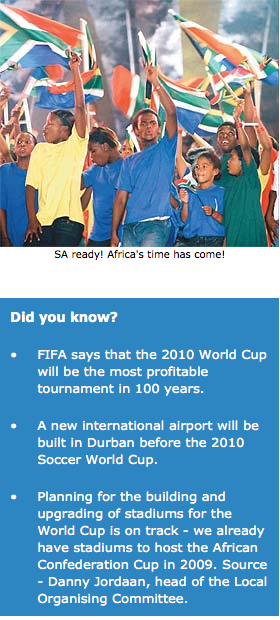
FLY THE SA FLAG HIGH
South Africa is alive with possibility and the African continent has great opportunities. The Minister in the Presidency, Essop Pahad, appealed to all South Africans to work together to tell the world about our country and continent.
Unforgettable experience
It is not only the government, the media and private companies that must spread the good news. Minister Pahad said the 2010 World Cup should be remembered as an event that left our country and the continent more united and more confident. "South Africans must take economic opportunities that come and make this World Cup an unforgettable experience for our visitors and our people," he said. Hundreds of people who work in communications were at the first 2010 National Communication Partnership Conference in Johannesburg in August. They spoke in one voice about using the 2010 World Cup to show South Africa and the entire continent to the world.
Opportunity of a lifetime
The conference was organised by the International Marketing Council of South Africa and Government Communications. It will be held every year until 2010. It aims toget everyone in the country and in Africa to carry out one message - a message that unites the country in making the most of this opportunity of a lifetime.
Involve everyone
Themba Maseko, head of Government Communications, said the World Cup was a chance to market the country to billions of people in the world. "This will boost our tourism, sport and economy." He said another challenge was to make sure that we involve everyone in the preparations for 2010 and in hosting the hundreds of thousands of visitors who come. Wherever we can, we should work with our neighbours and other countries in Africa to make the most of this first African World Cup.
Proud to be South African
Yvonne Johnston from the International Marketing Council said people should do whatever they can to promote their country during this time. "Buy South African flags and fly them high everywhere. Be proud of being a South African."
- Ndivhuwo Khangale
Advice
Advice sadminALBINISM - don't discriminate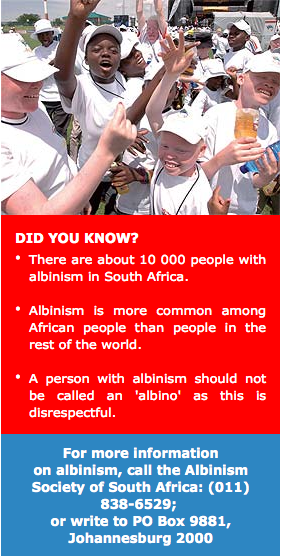
"As a person living with albinism, people tend to think that I'm different from them. They don't realise that there is nothing different about me; only my skin colour is lighter than theirs."
These touching words was part of an essay with which Mitchell Chuan, then a Grade 12 learner at Lushikishiki Senior Secondary School in Limpopo, won the 2005 Albinism Society of South Africa essay competition on albinism.
Albinism awareness
September is Albinism Awareness Month. During this month the Department of Health provides information on albinism to make people more aware of what this condition is about.
People living with albinism face a lot challenges like being discriminated against or called names because of their skin colour. This happens because there are still many mistaken beliefs about albinism. For example, some people still believe that albinism is some form of punishment from God. Others believe that a woman who gives birth to a baby with albinism has slept with a white man. This is not true and people with albinism should to be treated exactly the same as everyone else.
What is albinism?
Albinism is an inherited condition. This means it is carried over from past generations by parents to their children. It is caused by a fault in the skin pigment or colour called 'melanin'. This leads to a loss of colour in the skin, hair and eyes.
It happens when both parents carry one faulty and one normal gene. Genes are units in the body that parents pass to a baby before it is born. When a baby inherits two faulty genes, one from each parent, albinism is the result.
Some facts about albinism
- Albinism does not affect a person's intelligence.
- Albinism can cause problems with eye-sight.
- People with albinism are very sensitive to strong light.
How to prevent skin and eye problems
- Avoid direct sun on the skin at all times.
- Protect the skin and eyes by wearing dark glasses, wide hats, long-sleeved shirts and long trousers.
- Apply sun-screen creams to areas of the skin that are in the sun.
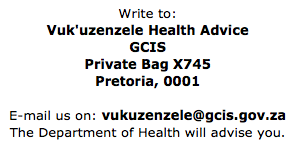
- Go to a skin specialist (a doctor who is an expert in the treatment of skin problems) regularly, especially if you have sores that do not heal quickly.
- Ndivhuwo Khangale
BLACKLISTED UNFAIRLY? THERE IS HELP
BLACKLISTED UNFAIRLY? THERE IS HELP sadmin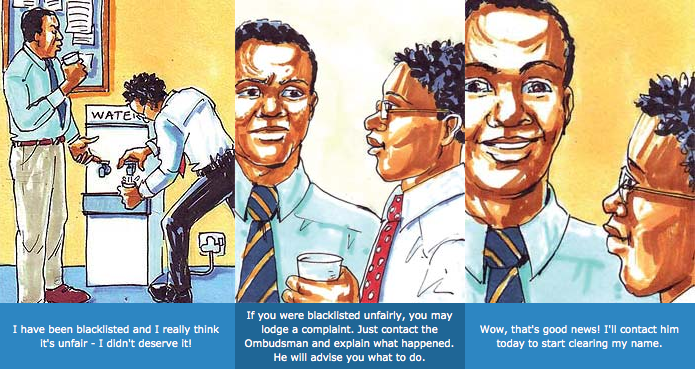
"Try to pay all your accounts on time. Make arrangements if you can't."
Thendo worked for a company that was not registered to do business. He was also not registered. He bought a bed at a furniture shop on hire purchase (paying off monthly instalments with high interest). Before he could finish paying his monthly instalments, his employer disappeared before paying him. He explained his situation to the shop owner where he bought the bed. He asked to be allowed to continue his payments as soon as he got another job. But the shop had already reported him to the credit bureau and he was blacklisted.
Failing to pay
After some time, he got another job and paid up the account. When he wanted to buy a car through the bank, his application failed. He was told that he was blacklisted for failing to pay the bed. The furniture shop said there was nothing they could do even if he had paid his bed in full.
Credit profile
Many people have a problem similar to Thendo's. But there is help, says the Credit Information Ombudsman. Thendo was advised to do the following: Firstly, he had to find out what kind of blacklisting he got. Was it 'default' or 'judgment' as explained in the May issue of Vuk'uzenzele. He wanted to apply for an early removal of the blacklisting and contacted the Ombudsman's office. He was asked to explain why he was blacklisted unfairly and had to lodge a complaint.
How to lodge a complaint
- Contact the Credit Bureau that blacklisted you and get a copy of your report to see the nature of the listing (you pay R25).
- Lodge a complaint with the Credit Bureau. They will give you a reference number.
- Wait for a month for the Credit Bureau to resolve the complaint.
- If you are not helped after 30 days, call 0861662837 (Ombudsman) and submit a complaint with the reference number you were given by the Credit Bureau.
- The Ombudsman will then investigate the matter.
Don't forget
- Do not buy on credit if you cannot afford to pay every month.
- Try to pay all your accounts on time. Make arrangements if you can't.
- If you move, give your new address to everyone that sends you accounts to ensure you receive them.
- Ndivhuwo Khangale
BOOSTING TECHNOLOGY SKILLS
BOOSTING TECHNOLOGY SKILLS sadminSKILLS DEVELOPMENT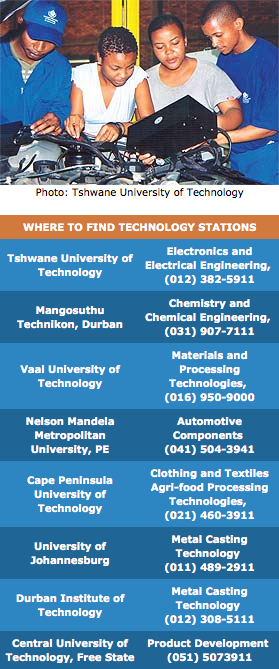
BOOSTING TECHNOLOGY SKILLS
Every year, many small businesses in South Africa shut down. This is often due to a lack of the necessary skills, technology and support. It means many small businesses are not run properly and cannot produce good quality products. To operate successfully, small businesses need skills and technology that will help them deal with the day-to-day running of their business.
Partnership
To address this problem, the Department of Science and Technology started a programme to help small businesses with world class technology. The programme is aimed at businesses in engineering, chemicals, electrical, electronic, food technology, and textiles and clothing. The programme is called Tshumisano - a Venda word meaning partnership or co-operation. It is a partnership between the Department of Science and Technology, the German Government and universities of technology and technikons and universities in South Africa. The plan for Tshumisano was taken from a system used successfully in Germany, called the Steinbeis System.
Universities
The programme benefits small factories and university students. Universities of Technology and Technikons throughout South Africa are involved in the programme. Through these partnerships, small businesses can improve the quality and output of their production. This allows them to supply their products to big factories and companies. With the help of Tshumisano, the universities started 'Technology Stations.' At these stations, students get practical training and experience in the skills needed by small businesses.
Skills
Depending on the courses students are studying, they are based at particular Technology Stations. For example Electronics and Electrical Engineering, or Chemistry and Chemical Engineering. They gain skills in technology that businesses with skills shortages can use. Universities report that their former students who participated in Tshumisano have a higher rate of success of being employed after spending time with these businesses. Businesses that participate in the programme have access to various government funding schemes.
- Ndiwhuwo Khangale

CALLING ON TRC VICTIMS TO CLAIM PAYMENT
CALLING ON TRC VICTIMS TO CLAIM PAYMENT sadminDo you have a Truth and Reconciliation Commission (TRC) reference number?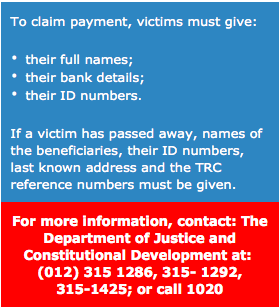
The government is calling on people who appeared before the TRC and were confirmed to be victims. They should come forward and collect R30 000 symbolic reparation (payment made to a particular person or a group of people as damages for loss) for the suffering they went through.
Only those who were declared as victims by the TRC should approach the Department of Justice with their TRC reference numbers.
The Department of Justice has reported that there are 1052 people who could not be traced. These people could have moved to new addresses or may have passed away. The Department is negotiating with the families of victims who have passed away to find out who the beneficiaries are so that the remaining money can be paid to them.
Government is asking community-based organisations to help in the search for people who have not claimed their payment.
- Justice Mohale
CARTOON STRIP
CARTOON STRIP sadminCARTOON STRIP
ENVIRONMENTAL PROGRAMMES

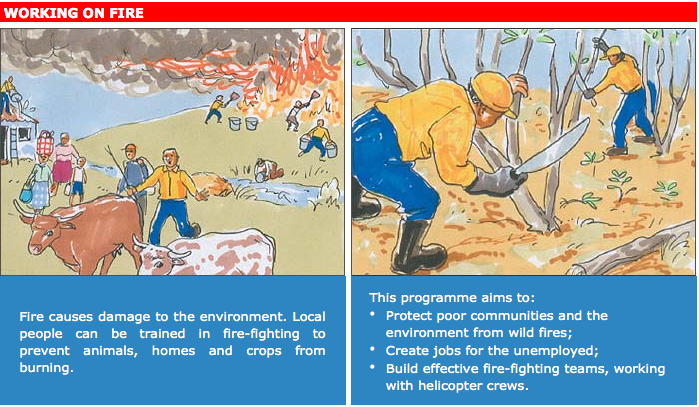
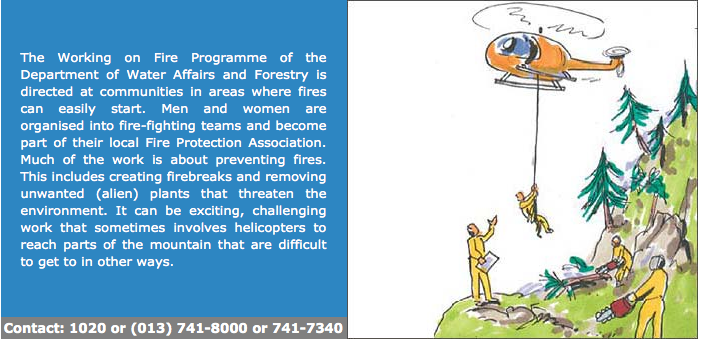
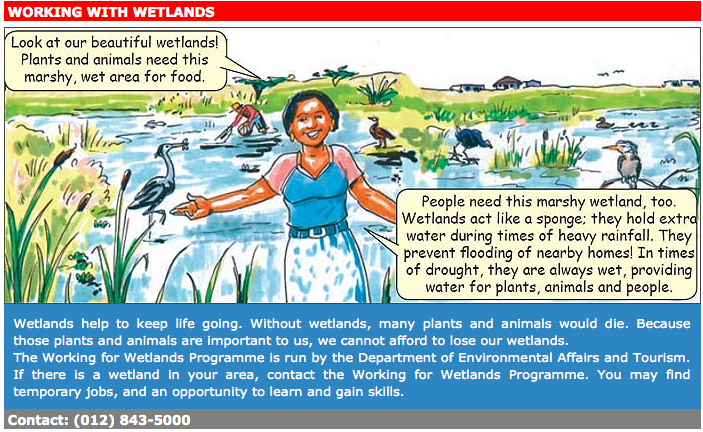
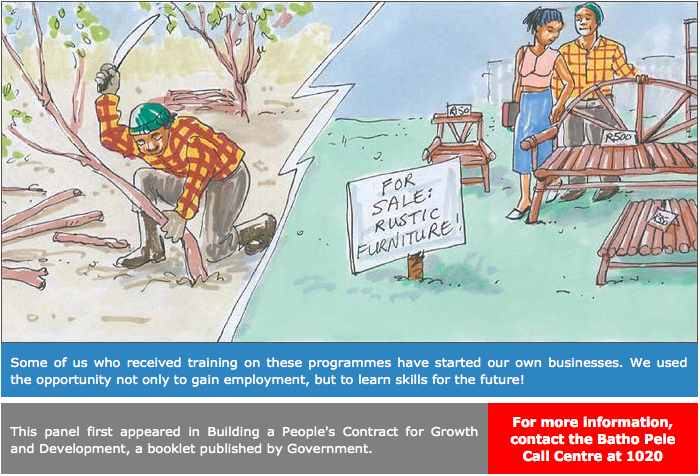
COMMUNITY TOURISM: LAND OF THE AMAMPONDO
COMMUNITY TOURISM: LAND OF THE AMAMPONDO sadminCOMMUNITY TOURISM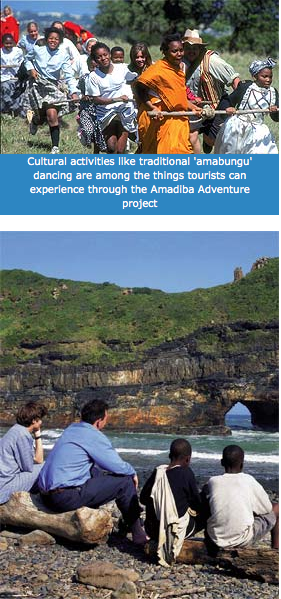
LAND OF THE AMAMPONDO: TOURISTS VISIT AND COMMUNITIES BENEFIT
It will be difficult for a person living in the city or a township to understand life in Amadiba village in the Eastern Cape. Amadiba is a deep rural area in the OR Tambo District under Mbizana municipality. This is part of the area called the Wild Coast. The village is situated in a long, flat dry area of land. Most notable landmarks are beautiful hills with caves, rivers and streams that flow towards the sea. Driving in the village is a great experience - you follow the tracks made by cars that travelled before you.
Amadiba Adventure
When a vehicle drives through the village, some children watch with great interest; others run back to their mothers in the rondavel houses. Families live as units far away from each other, but they know each other very well. It is all these features that attract tourists from all over the world to this land of the Amampondo people.
In 1997, the people saw that tourists loved visiting their area. They started a community tourism project called Amadiba Adventure. Through this project, local people use their horses to take tourists for rides along the beach front, show them the rock caves in the hills and cultural activities in the village.
Tourists are taken for visits to the sangomas, and to see waterfalls and animals. The project received money from Ntsika in the Department of Trade and Industry that helps people with money to start small businesses.
Employment
In 2002, the European Union heard of the project. They asked the Department of Environmental Affairs and Tourism to identify similar projects in all the disadvantaged communities in the Wild Coast area. The Department is now running a number of community tourism projects countrywide.
This helps to create jobs where there were no job opportunities before. The European Union donated R84 million to areas around the Wild Coast alone. A total of 300 community projects were started and 1 470 jobs created in the area. However, as time went by some of the projects stopped.
Training
The Amadiba Adventure project is one of the most successful projects. It received about R9 million from the money donated by the European Union. The money was used to train local people in tourism.
The training included tour guiding, preparing traditional food for tourists and taking tourists on horse trails. Two bush camps where also built. Here, tourists enjoy Amampondo cultural dances, food prepared by villagers and story telling at night.
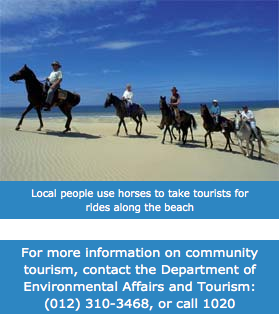
Shared profits
The Amadiba Adventure Project has now developed into a Trust. This means the project belongs to the whole community and everyone benefits from the money earned.
Members of the Trust are appointed by the community and the profit made is shared among the community. Some of the money is also used to pay agencies that market the project nationally and internationally
- Ndivhuwo Khangale
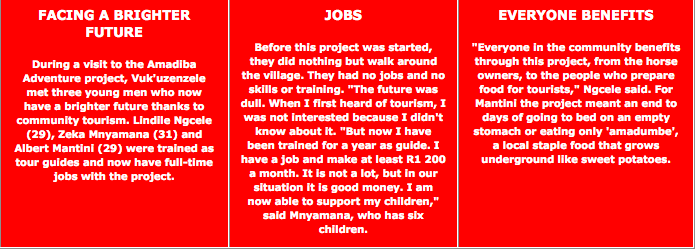
GET TOGETHER AND DO BUSINESS
GET TOGETHER AND DO BUSINESS sadminCO-OPERATIVES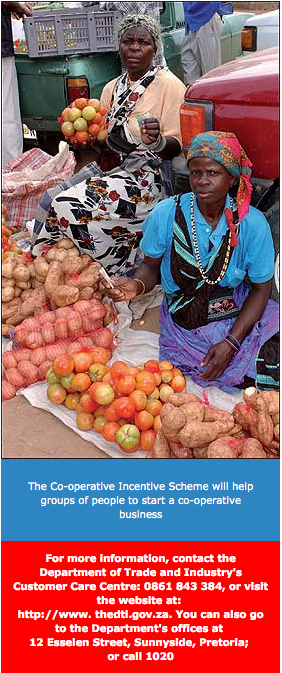
GET TOGETHER AND DO BUSINESS
Are you unemployed and there are others like you? Put on a united front and the Department of Trade and Industry can help you to start your own business. But, it can only happen if you draw up a plan for a business you will run jointly with your partners. It is called a co-operative and this is how you do it.
Incentive Scheme
Before applying for money from the department, you must register the co-operative. The Department started the Co-operative Incentive Scheme last year to make money available to co-operatives in the Second Economy.
"By helping to develop and promote co-operatives, the Scheme is a way of improving poor and unemployed people's lives," said Patience Mbewana of the Co-operatives Development Unit in the Department of Trade and Industry. The Co-operative Incentive Scheme supports the government's plan to cut unemployment by half in the next eight years.
Existing co-operatives
Mbewana said the Co-operative Incentive Scheme would also benefit existing co-operatives. The Department will grant a cooperative 90 per cent of the funds it needs to run its business. Any cooperative that successfully applies for money will qualify for not more than R300 000. The Co-operative Incentive Scheme aims to ensure that:
- poor people get money to start their own co-operatives;
- co-operatives owned by previously disadvantaged people, for example black people, women, disabled people and youths, become part of the formal economy;
- the economy grows faster to support job creation programmes;
- co-operatives play an important role in our economy and in supporting black economic empowerment. Funds from the Co-operative Incentive Scheme will only be given to cooperatives that:
- are registered in South Africa under the Co-operatives Act 91 of 1981;
- focus on things like manufacturing products or goods, trading, services and farming.
- be able to prove that members hold regular meetings to discuss their business;
- prove that there are markets where their products or services can be sold.
Important to register
A co-operative must be registered so that it can be recognised and run as a lawful business. A co-operative can be registered at the Companies and Intellectual Property Registration Office, located within the Department of Trade and Industry.
- Justice Mohale

IMBIZO FEEDBACK: VISIBLE GOVERNMENT STOPS BY TO LISTEN
IMBIZO FEEDBACK: VISIBLE GOVERNMENT STOPS BY TO LISTEN sadminIMBIZO FEEDBACK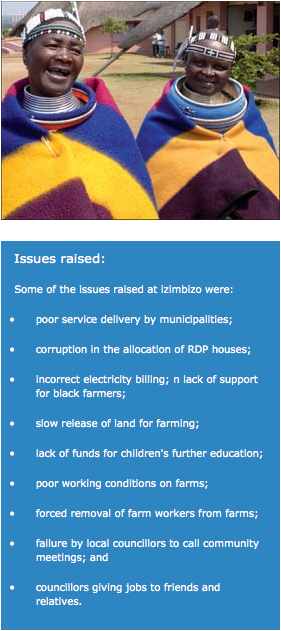
VISIBLE GOVERNMENT STOPS BY TO LISTEN
Residents should be getting used to the sight of Ministers, Deputy Ministers, Premiers, MECs and mayors visiting communities countrywide. The campaign gets more intense with this year's second National Imbizo Week from 26 - 31 October. Thanks to izimbizo, more and more people are learning about government's programmes to improve their lives. They are also getting to know their local councillors and have opportunities to talk to senior government officials. Some get to meet the President or Deputy President.
Right to be heard
Through izimbizo, all levels of government meet with local communities. It gives communities a chance to use their right to be heard. Their views help government to build a better life for all.
Task team
A task team has been set up to help organise the imbizo programme. The team includes representatives from different government departments. Communities will be informed of izimbizo in their areas through local municipalities and ward committees.
Achievements
Since it was started, Izimbizo have:
- given communities a chance to use their democratic right to be heard;
- helped government to see what problems communities experience on the ground;
- helped government to see which communities had the greatest need; and
- given government and communities a chance to work together to find solutions to problems.
Five-year plans
So far, most local municipalities have adopted Integrated Development Programmes. About half have approved Local Economic Development plans. This is in line with the five-year plans adopted by municipalities after the local elections to improve service delivery.
- Justice Mohale

IMPROVING SERVICE DELIVERY - RE-EMPLOYING SKILLED PEOPLE
IMPROVING SERVICE DELIVERY - RE-EMPLOYING SKILLED PEOPLE sadminIMPROVING SERVICE DELIVERY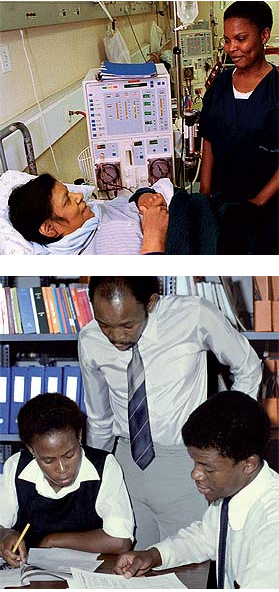
RE-EMPLOYING SKILLED PEOPLE
Public hospitals are ready to give you better service. Since the Department of Health started a programme to re-employ retired nurses in hospitals and clinics, service-delivery has improved.
Human Resource Plan
A few months ago, the Department of Health launched the National Human Resource Plan. This is part of the Department's plan to address the shortage of skilled people in health-care jobs. The plan will help the Department to find out how many nurses are needed to improve service delivery in public hospitals.
Maternity or study leave
Sibani Mngadi from the Department said they were identifying retired nurses who could still give their services to public hospitals.
Because retired nurses have a lot of experience, they can give some guidance to the nursing profession. This will help the Department to find answers to some of the challenges they are facing, like the poor quality of care in hospitals.
Some provincial hospitals are getting retired nurses to fill the positions of staff who take maternity or study leave to help them give better service.
Mngadi said the move to employ retired nurses would not only help the Department to improve service to the sick and the poor, it would also help younger nurses and student nurses to serve their communities with pride.
Training colleges
The Department is dealing with the shortage of skills in other ways too. These include getting health professionals like doctors from other countries; reopening some nurses' training colleges that have been closed down; and introducing more trained people into the public health system by offering training in scarce skills.
- Justice Mohale


LETTERS
LETTERS sadminLETTERS TO THE EDITOR
GIVE US A PIECE OF YOUR MIND

Teach them to dream big!
We find that with so much talk about Aids, it is all doom and gloom. Kids assume that they are going to end up HIV positive anyway, so why bother? They have given up on life. Rather treat your teens as individuals. Ask them: “What is really important for you in life?” And “What is going to help you achieve it?” When people have goals they will be more likely to avoid things that will prevent them from getting closer to that goal. It is the same for teens when they have special goals. So encourage your kids to have passions in life, to pursue the things that interest them, to have faith in themselves and chase their dreams. It might seem difficult if your child, for example, dreams to be a movie star. But as Lucas Radebe said, he came from Diepkloof in Soweto and people didn’t think he would get anywhere. And look where he is today.
- Tshovhota Khubvi, Limpopo
Don't be destructive
I would like to appeal to some South Africans who always make it their business to damage public facilities like traffic signs and lights, public phones, bus stop shelters and public toilets to stop their mad and destructive behaviour. If we continue with this kind of behaviour we are going to chase foreign tourists away. And the economic boost that we all hope for during the 2010 Soccer World Cup will only be a dream. To the soccer fans who cannot take kindly to the fact that their favourite team has been defeated in a match, please stop taking your frustrations and anger on the facilities provided at the stadiums. This will also scare soccer fans who may be coming to the country in 2010. As a 16-year old, I suggest that heavy penalties should be meted out by Government to those who break the law. We are the government and all these amenities belong to everyone.
- Aobakwe Patso Mosimanekgosi, Kuruman, Northern Cape
Listen to our voices
As community members we vote for other people to be our representatives, but they promise us things they cannot do. The Government is talking about Batho Pele, but our representatives are not acting responsibly. They want us to vote for them, but they don’t perform their duties as expected by us the voters. Government is trying hard to make South Africa a better country, but there are places in Qwa- Qwa where there’s still no electricity, proper houses or roads. Some of the money from Government to rebuild our communities is used to build temporary houses that are like tins. When it rains heavily they are flooded and people die. If our representatives don’t do their work, let’s tell them to wake up or report them to the Government.
- Thabiso Ntsane Alex, Witsieshoek, Free State
Service please!
During the local elections people we§nt out in numbers to vote. After the elections we were promised good services, but in vain. In the townships the situation is getting worse. Nothing has improved. The worst problem is that whenever the people want services, they have to toyi-toyi, burn tyres and throw rubbish in the streets. Why do we have to toyi-toyi to make things happen? I appeal to councillors to improve the standard of our townships. Please render the service you promised. Think about the future of our children.
- Sipho Vazi, Ezibeleni, Eastern Cape
Reply from the Chief Directorate, Policy and Research, Government Communications:
The issues you raise are very important. After the local government elections, each municipal district adopted what was called the ‘fiveyear plan.’ This plan listed all the services each municipality had to deliver. We advise you to find out who the local councillor in your area or ward is and tell him or her what your problems are. You can suggest to them what you think they should do to meet your delivery needs according to the five-year plan. They have promised to implement this plan which must make your life better.
None of us are losers
Vuk’uzenzele magazine prompted me to remind my fellow South Africans that no one is a loser unless he or she decides to be one. The main reason people see themselves as losers is laziness and a lack of patience. I would like to tell those who say ”I have nothing in hand to start a business,” you can start a business with a one rand coin, because the million you need may be hidden in that coin. You don’t have to start something big; start a small thing and let it grow. You are not a loser, but a winner, therefore: Vuk’uzenzele!
- George Agrippa Tshawe, Lusikisiki, Eastern Cape
Great performance!
The 2006 FIFA World Cup has come and gone. The presence of newcomers such as Togo, Ghana, Ivory Coast and Angola is a great achievement for African soccer. For a change, in Germany the world witnessed another side of Africa. Hopefully 2010 will produce other new faces like Botswana, Chad, Libya or Zambia. With the brilliant goals scored by the likes of Ghana’s Sulley Muntari and Ivory Coast’s Ibrahim Kone, no one should be surprised to see Sudan, Lesotho, Rwanda and Kenya side-lining the giants of African football like Nigeria, Cameroon, Senegal and Morocco, in 2010. If Germany 2006 was good, then come 2010 and Africa will show the world what a great spectacle is all about!
- Lehlohonolo S. Maduna, Vaal Triangle

MUNICIPAL JOBS LEAD TO WIN-WIN SITUATION
MUNICIPAL JOBS LEAD TO WIN-WIN SITUATION sadminUNPAID DEBTS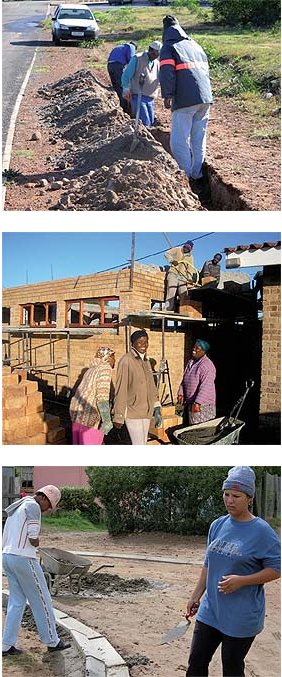
MUNICIPAL JOBS LEAD TO WIN-WIN SITUATION
The Auditor General's office is sitting with a huge headache. Municipalities throughout the country are owed R19,2 billion by residents. But a local municipality in the Western Cape has come up with a simple plan to collect its outstanding debts. The plan can be copied by other districts. The Overstrand Local Municipality has a win-win solution where defaulters can work, pay their debts and still put money in their pockets.
Skills are improved
Overstrand is about 120 kilometres from Cape Town. The municipality gives jobs to people who cannot pay their rates. Part of the money they earn is used to pay their outstanding accounts.
Overstrand's local economic development manager, Kobus Arendse, told Vuk'uzenzele that the project was an important way of showing the municipality's willingness to reach out to the community. He said the project does not only help the municipality to recover debt. It also reduces poverty and helps people to develop skills.
How it was done
People who owe money, but cannot work because they are disabled, sick or old, are not excluded from the project. The municipality helps them by allowing unemployed young people to represent them by working on their behalf. The pilot project was started last year in Zwelihle Township.
It gave jobs to 18 people who owed the municipality about R100 300 in unpaid rates and services. At the end of the project, the municipality recovered R91 796. Arendse said they were happy with the amount of money the municipality collected. "We paid the workers 60 per cent of the money they worked for."
The second project in the region was at Hawston Township, where a clubhouse was built using the same salary system. A third project, also using the residents as the work force, involved putting up street lights in Sandbaai.
Others could follow
Arendse believes other municipalities should follow Overstrand's example to improve the conditions of people in their own communities. He said the projects would also save municipalities the time and trouble of advertising and appointing people or companies to provide certain services that their own residents are capable of doing.
- Justice Mohale

OUR LEGAL SYSTEM: HOW DO OUR COURTS WORK?
OUR LEGAL SYSTEM: HOW DO OUR COURTS WORK? sadminOUR LEGAL SYSTEM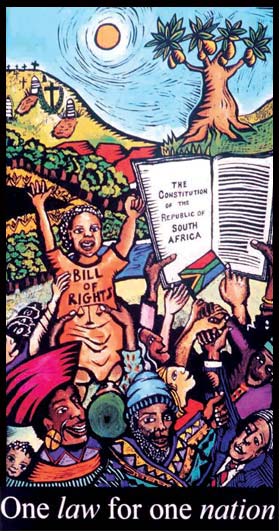
HOW DO OUR COURTS WORK?
South Africa's justice system consists of different courts that deal with different types of cases.
Constitutional Court
The Constitutional Court is the highest court in all matters relating to the Constitution of South Africa. It has the final say. It can, for example, decide whether laws made in Parliament and the actions of the President and Ministers are in line with the Constitution and the Bill of Rights.
The Chief Justice of South Africa, the Deputy Chief Justice and nine other judges make up the Constitutional Court. The Court was started in 1994. The building is situated on Constitution Hill in Johannesburg.
Supreme Court of Appeal
The Supreme Court of Appeal hears appeal cases. To 'appeal' means taking a case from a lower court to a higher court to take another look at the lower court's decision or judgement. The Supreme Court of Appeal has the final say on all matters except those meant specifically for the Constitutional Court. The Supreme Court of Appeal is situated in Bloemfontein in the Free State.
High Court
The High Court has divisions in different areas of the country.
The divisions of the High Court hear cases about matters in their specific areas. This includes civil matters that involve more than R100 000. Civil matters mean cases that are not criminal.
In a civil action one person or group usually takes another person or group to court, mostly for money damages. The divisions of the High Court also deal with criminal cases. Criminal cases involve acts that are against the law and harmful to other people.
There are 10 provincial divisions of the High Court and three local divisions. Circuit courts are part of the High Court. They travel to remote rural areas to serve people who do not have access to courts.
Magistrate's Courts
Magistrate's courts are the lower courts. There are more than 400 magistrate's courts in South Africa. They are divided into Regional Courts and District Courts. 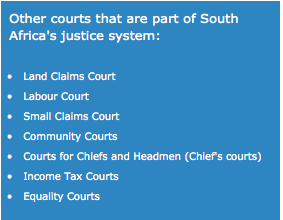
Magistrate's courts deal with most general matters, but do not hear civil cases where more than R100 000 is involved. Magistrate's courts do hear some criminal cases in the regions, but the most serious criminal cases are heard in the High Court.
- Louise van Niekerk
OUR LIVES CAN BE CRIME- FREE
OUR LIVES CAN BE CRIME- FREE sadminFIGHTING CRIME
TOGETHER OUR LIVES CAN BE CRIME FREE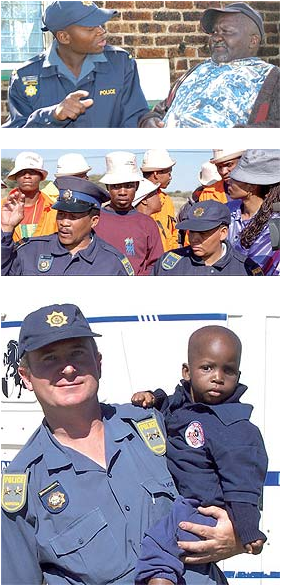
Crime affects everyone and everyone wants crime to stop. One of the most important things that help with the fight against crime is the Community Policing Forums. These Forums operate at grassroots level within communities and work closely with the police. In many townships, crime has been reduced as a result of this joint effort.
Community Policing Forums
Community Policing Forums' Board Chairman in Gauteng, Zacharia Motaung, told Vuk'uzenzele that the Forums help police with information that can help prevent crime or find wanted criminals. For example, the good working relations between the Forums and the police have led to the arrest of a number of criminals and helped police to find stolen goods. "We are trying hard to create a crime-free society, and we are winning. This is good news for all," he said.
"Eyes and ears" of the police
Residents appoint members of Community Policing Forums. Therefore the Forums represent their communities. "These people are just volunteers. We must be proud of their work and their contribution towards making our country safer," Motaung said. In Gauteng, the Department of Community Safety helped 12 police stations to set up Community Policing Forums. Every Forum has 15 executive members. The Forums have become very important in the fight against crime, said Tebogo Lebudi of the Gauteng Department of Community Safety. The Forums are not the police, but they serve as "the eyes and ears" of the police, he explained.
Gangsters
In Reiger Park on the East Rand, gang violence has left many people dead. Since a Community Policing Forum was started there last year, its members have helped recover a lot of stolen goods and unlicensed guns. It also helped with peace talks between gangsters, he said. In townships like Vosloorus and Tembisa the Forums have helped to reduce crimes like domestic violence, taxi violence and robberies. To help members of the Forums to improve their skills, the department is assisting them to attend training programmes, like conflict resolution and management, Lebudi said.
- Justice Mohale
POLICE STATIONS SPEED UP SERVICE
POLICE STATIONS SPEED UP SERVICE sadminFIGHTING CRIME
POLICE STATIONS SPEEDING UP SERVICE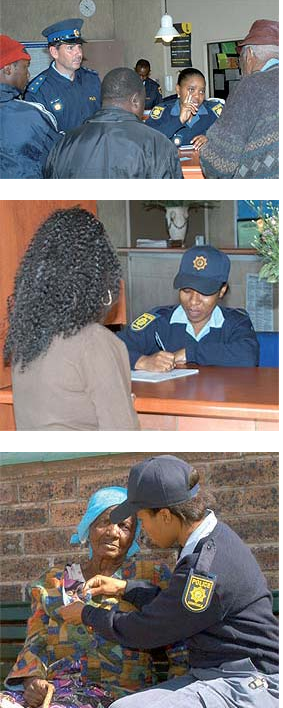
A news story on television showed an angry group of people toy-toying in the street. They wanted the release of community members who were arrested for attacking a man who raped and brutally killed a young girl. The angry residents said they took the law into their own hands because the police took too long to arrest the man. Similar incidents have also occurred in other communities.
Change
A new programme will soon be started to reorganise police stations. The police top management has examined the problems around the way they work and has suggested some important changes. By improving the way things are run, the programme will make police stations stronger and help the police to react quicker to crime. For example, police stations do not have specialised units that deal with specific crimes. Specialised units deal with crimes like rape, hi-jacking, child and women abuse, domestic violence, car theft and robbery. They include the:
- Serious and Violent Crimes Unit;
- Area Crime Combating Unit;
- National Intervention Unit;
- Vehicle Identification and Safeguarding Unit; and the
- Family Violence, Child Protection and Sexual Offences Unit.
Delays
Police stations do not at the moment have trained police who can deal with such cases immediately and the specialised units are situated far away from most police stations. This means that if you contact the police to report a case of car theft or rape, the police will have to call the particular unit that works with such crimes. This causes delays. By the time the police arrive at the scene of the crime, some important evidence or even the suspects may have disappeared.
Levels
The police operate on four different levels. These are the national, provincial, local and area levels. As part of the programme of change, the area level will fall away, leaving only three levels. A provincial commissioner will also have two deputies instead of four. This is to avoid having many people doing a job that could be done by one or two people. Experienced high-ranking police officers, like commissioners and directors, will be sent to local police stations to train and advise new staff. The changes will make police stations stronger. Service will improve, police will be able to react quicker to calls from the public and people will be safer. The programme is expected to start before December 2006.
- Ndivhuwo Khangale
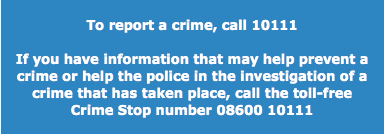
RELATED SNIPPETS...
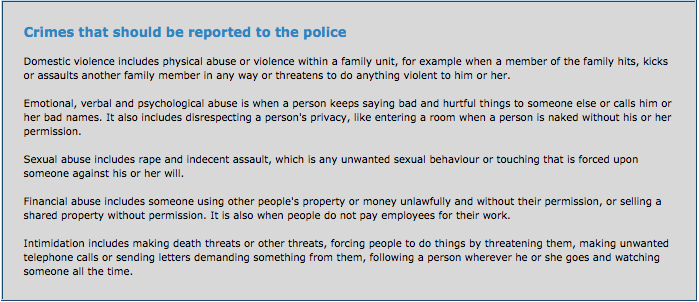
PUTTING OUR YOUTH FIRST
PUTTING OUR YOUTH FIRST sadminPUTTING OUR YOUTH FIRST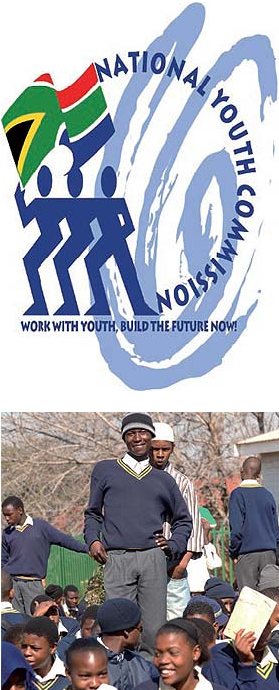
South Africa's youth played an important role in the struggle for freedom. When the first democratic government came into existence in 1994, one of the first things they did was to set up the National Youth Commission. The Youth Commission’s key role is to ensure that the youth’s interests are always considered when government discusses national matters. This includes the budget for education, skills development and health facilities. The Youth Commission is in the office of President Thabo Mbeki.
The Commission has started a number of programmes for the youth:
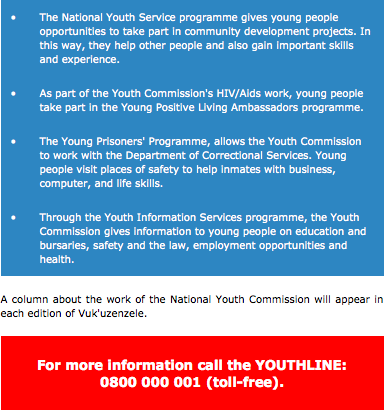
ROLE MODELS
ROLE MODELS sadminROLE MODEL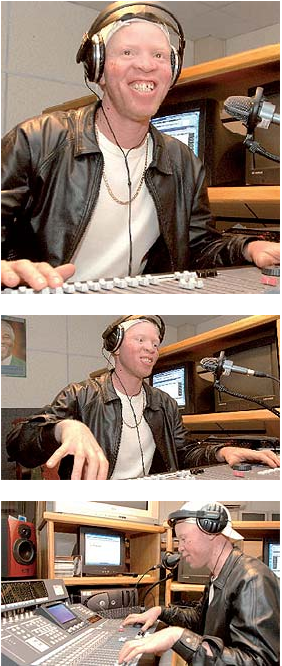
EVERYBODY LOVES DJ FISTO
Albinism did not stop him
Bafana Dludla, or Fisto as he is known, is the third of four brothers and the only one in the family with albinism. But his skin condition has never made him feel less important. Dludla (32) says his positive outlook on life has more to do with how people close to him have treated him since he was a child growing up in Enxiweni Section in Tembisa, Johannesburg.
The treatment Bafana Dludla received from his parents, family and community members made him what he is today. Dludla is lively, talkative, confident and street-wise. From the way he dresses, walks and talks, you can see that he is from 'ekasi' or a township. His stylish, short black leather jacket, cream trousers, matching sneakers and a cap, clearly show that Dludla has a vibe.
Much to be proud of
Despite his skin condition, called albinism, Dludla has a lot to be proud of. When he appeared on TV dancing on the then famous music programme Lapologa in the late 1980s, people told him he was the first person with albinism to have done so. In 2002, he was a dancer for the well-known group Iph'intombi. He has also acted in an educational drama Kenako on SABC2.
'I used to be angry'
Today, Dludla is commonly known as DJ Fisto in Tembisa. He loves house music. In 1999, he bought equipment and started playing music at clubs, weddings, parties and street bashes. He now plays for the Voice of Tembisa, a local community radio station and is working on his first house album.
He is also training a group of young dancers in the township. Dludla speaks highly of his community and family, including his mother who passed away in 1983. "They never made me feel that I was different from other children. The only time I felt different was when I was about 12 years old.
Other children refused to touch me or to share things with me and called me 'lekgowa' (white person)," he said. "I used to be very angry, but as I grew older, everyone loved me. At school the girls liked me and I had girlfriends.
My brothers would fight anyone who called me names. "My mother told me a lot about my skin condition and prepared me to face discrimination." He now has a girlfriend and says he would love to marry her "if God wants it."
Eyesight problems
Dludla attended primary and high school in Tembisa, but he couldn't finish matric because of problems with his eyesight. He has a 13-year-old daughter who lives with her mother.
– Ndivhuwo Khangale
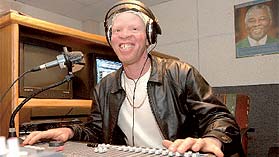
SEPTEMBER 24, HERITAGE DAY - CELEBRATING WHO WE ARE
SEPTEMBER 24, HERITAGE DAY - CELEBRATING WHO WE ARE sadminSEPTEMBER 24, HERITAGE DAY
CELEBRATING WHO WE ARE
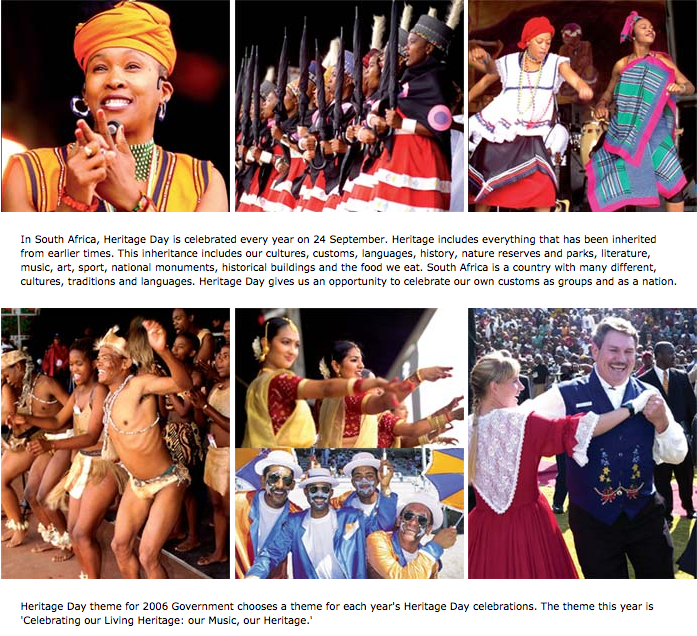
Social grants - No more delays
Social grants - No more delays sadminNEWS YOU CAN USE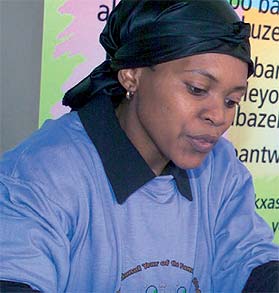
SOCIAL GRANTS - NO MORE DELAYS
Social grants are reaching beneficiaries quicker. More pay-points are being established and waiting time in queues is reduced. These and other benefits are thanks to a new body, the South African Social Security Agency (SASSA), that started working in April this year.
SASSA's aims
SASSA was formed to solve problems like delays in approving and paying out grants, corruption, poor facilities at pay-points and high delivery costs. Spokesperson for SASSA, Paseka Letsatsi, said SASSA's work reduced the workload of the provincial governments, which used to deal with social grants. In this way provincial governments are supported by the national government to ensure better delivery. The chief executive officer of SASSA, Fezile Makiwane, is now busy with a countrywide programme in what is called "same day approval for grants," Paseka explained.
Benefits of SASSA
- paying out social grants to all beneficiaries countrywide;
- cutting the waiting period for grants from three months to 14 working days;
- setting up pay-points within walking distance of communities;
- ensuring that all pay-points have toilets, electricity, enough seating and security; and
- ensuring that only people who have a clean record are given jobs.
- Justice Mohale
TRADITIONAL HEALERS: TRAINED TO IDENTIFY SIGNS OF HIV/AIDS
TRADITIONAL HEALERS: TRAINED TO IDENTIFY SIGNS OF HIV/AIDS sadminHIV/Aids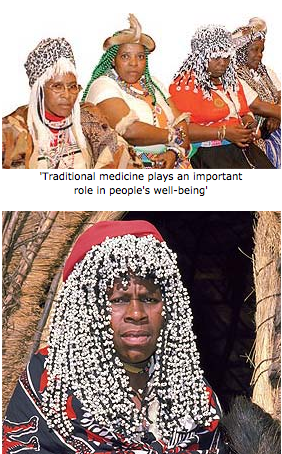
TRADITIONAL HEALERS - TRAINED TO IDENTIFY SIGNS OF THE DISEASE
Many people use traditional medicine. In South Africa, there are more than 200 000 traditional healers. This is according to a study by the World Health Organization. Traditional healers have a lot of support and cannot be ignored, especially if we want to win the fight against deadly diseases like HIV/Aids, tuberculosis (TB), cancer and malaria.
The right to choose
South Africa's plan for dealing with HIV/Aids, says patients have the right to choose between traditional medicine and medicine given by doctors and clinics. The Department of Health is working closely with traditional healers. It is also offering training programmes for traditional healers on how to identify signs of diseases like Aids and TB. Health Minister Manto Tshabalala-Msimang said people should take traditional medicine seriously. She was speaking at the African Traditional Medicine Conference held in Benoni recently. 'Traditional medicine plays an important role in people's wellbeing', she said.
Training programme
Many people who have diseases like HIV/Aids blame witchcraft for their illnesses. The Department of Health started training programmes for traditional healers in all the provinces. They learn to identify diseases and to tell patients to go clinics and hospitals for treatment, instead of blaming witchcraft. The training programme was started five years ago. Healers who do the training receive certificates, but this does not mean that they are qualified doctors. The certificates only show that they attended training by the Department of Health to help them identify certain diseases.
University
The Nelson Mandela School of Medicine at the University of KwaZulu-Natal runs workshops for traditional healers. They learn skills like how to identify diseases and counsel their patients. They also learn how to keep and store information about their patients. Dr Nceba Gqaleni runs the programme. He said during the workshops, traditional healers discuss different problems among themselves, but professors, doctors and nurses from the University give support and ideas.
Agreement
The workshops run for five days and participants get certificates for attending. So far, 170 traditional healers have received certificates. With the help of the Department of Health in the pro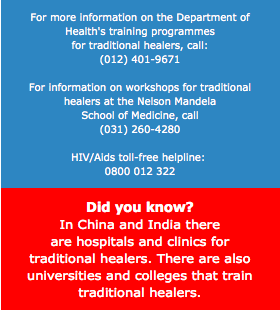 vince, the programme also buys materials like buckets and other things needed by the traditional healers to make their job easier, clean and safe, Gqaleni said. The programme started in 2003. The University signed an agreement with traditional healers that the School of Medicine will help with their development. The programme has received American funding from the United States Emergency Plan for Aids Relief.
vince, the programme also buys materials like buckets and other things needed by the traditional healers to make their job easier, clean and safe, Gqaleni said. The programme started in 2003. The University signed an agreement with traditional healers that the School of Medicine will help with their development. The programme has received American funding from the United States Emergency Plan for Aids Relief.
- Ndivhuwo Khangale
RELATED SNIPPETS...
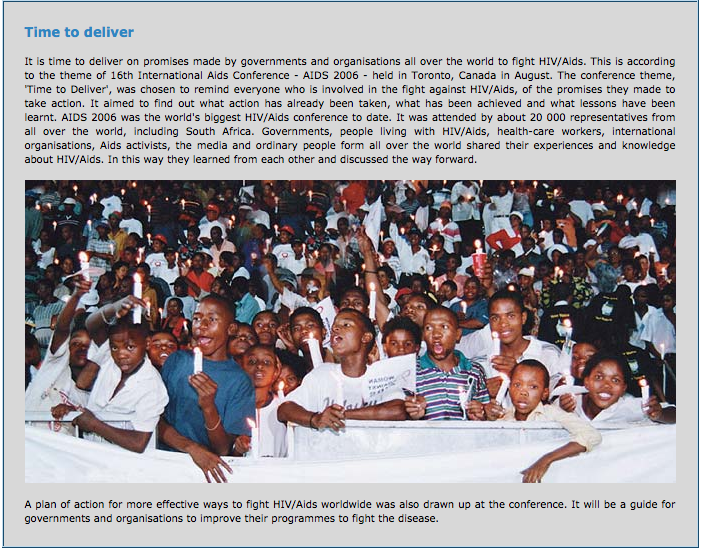
YOUR BABY'S HEALTH - HIV MOMS CAN BREAST-FEED
YOUR BABY'S HEALTH - HIV MOMS CAN BREAST-FEED sadminYOUR BABY'S HEALTH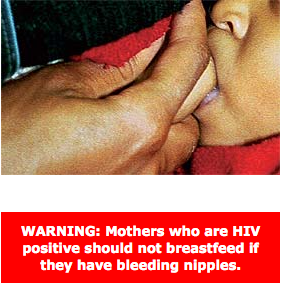
HIV MOMS CAN BREAST-FEED ...BUT DON'T MIX BREAST WITH POWDERED MILK
Mothers living with HIV can safely breast-feed their babies for the first six months of the baby's life. Phuti Seloba from Limpopo Health and Social Services said breast-milk remained the best food for the healthy growth and development of all babies. "We must try by all means to protect women from dangerous statements that say powdered milk for babies is the only option for HIV positive mothers," he said.
World Breast-feeding Week
Seloba said it was true that it's safe for women living with HIV to breast-feed for up to six months. After six months they could start giving powdered milk made specially for babies. It is advised that mothers who do not have HIV should breastfeed their babies until they are two years old to keep them healthy, he said.
Mixed feeding
Professor of children's medicine at the University of KwaZulu-Natal, Anna Coutsoudis, did a study on HIV and breast-feeding. She found that it was safe for HIV positive mothers to breast-feed their children for up to six months, as long as they didn’t combine this with powdered milk. Mixed feeding brings things into the baby's body that can cause irritation or allergies. This also makes it easier for the HI virus to pass from mother to child, explained Professor Coutsoudis. She said the risk of HIV being passed on to babies was even less if they were fed only on breast milk until three months.
- BuaNews